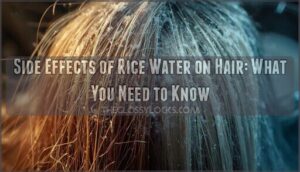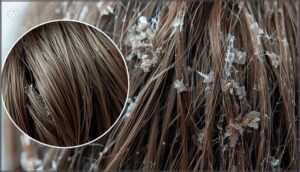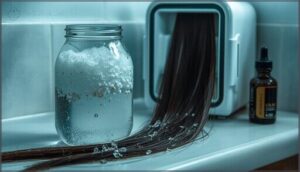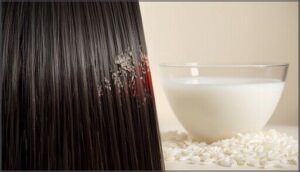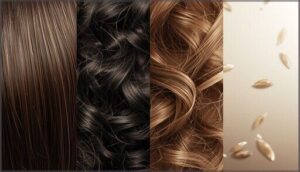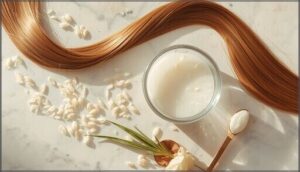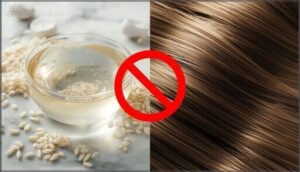This site is supported by our readers. We may earn a commission, at no cost to you, if you purchase through links.
Your hair feels stiff, straw-like, and somehow drier than before you started that viral rice water routine. You’re not alone—thousands of people discover too late that this ancient beauty secret can backfire spectacularly when used incorrectly.
The problem isn’t rice water itself, but rather how protein and starch interact with your specific hair type and porosity level. Low porosity and fine hair textures are especially vulnerable to buildup, brittleness, and moisture loss that can take weeks to reverse.
Understanding the side effects of rice water on hair before you commit to regular treatments protects you from unnecessary damage and helps you decide whether this trend deserves a place in your routine.
Table Of Contents
- Key Takeaways
- Common Side Effects of Rice Water on Hair
- Why Rice Water Can Cause Hair Problems
- Hair Types Most Affected by Side Effects
- How Overuse Leads to Hair Damage
- Tips to Prevent Rice Water Side Effects
- When to Avoid Rice Water Treatments
- Frequently Asked Questions (FAQs)
- Can rice water cause hair loss?
- Can rice water change the color of your hair?
- Can rice water be used on all hair types?
- Can rice water cause hair color to fade?
- Does rice water work on chemically treated hair?
- Is fermented rice water safer than plain rice?
- Can rice water trigger dandruff or flaking issues?
- Conclusion
Key Takeaways
- Rice water’s high protein and starch content can cause buildup, brittleness, and moisture loss—especially in low porosity and fine hair types that trap residue more easily than coarse or high porosity strands.
- Overuse leads to protein overload (stiffness, breakage, reduced elasticity) and drops scalp moisture by up to 10% within 24 hours, creating a cycle of dryness that worsens with repeated applications.
- You can prevent side effects by diluting rice water 1:1 to 1:3 with plain water, limiting use to once weekly, rinsing thoroughly for 60+ seconds, and following up with a lightweight conditioner to restore moisture balance.
- Skip rice water entirely if you have pre-existing scalp conditions like seborrheic dermatitis or eczema, experience allergic reactions (redness, itching, rashes), or notice persistent irritation that doesn’t improve after adjusting your routine.
Common Side Effects of Rice Water on Hair
Rice water isn’t the miracle treatment everyone claims it to be—it can actually backfire on your hair if you’re not careful. While many people see great results, others experience frustrating problems that leave their hair worse than before.
Let’s break down the most common side effects you need to watch out for.
Protein and Starch Buildup
Overuse of rice water can trap you in a cycle of buildup. Starch deposition and protein accumulation coat your hair shaft, creating a chalky, stiff texture that resists moisture. Here’s what buildup looks like:
- Waxy residue that won’t wash out, signaling starch deposition on your cuticle
- Dull, lifeless strands from protein overload blocking shine
- Tangled, unmanageable hair as buildup mixes with styling products
- Reduced curl pattern when protein accumulation alters hair porosity
- Slower moisture absorption between washes, hampering buildup prevention
Hair porosity testing reveals how vulnerable you are to hair cuticle damage from rice water benefits and drawbacks—fine hair especially suffers stiffness from protein treatment gone wrong.
Increased Hair Dryness
That buildup you just learned about? It sets the stage for relentless hair dryness. Rice water concentration matters—too strong or left on too long, and residual starch strips your natural oils, leaving strands brittle. Hair porosity effects magnify this: low-porosity hair locks moisture out, while high-porosity hair can’t hold it in. The result? A dry scalp and damaged cuticles.
Dryness prevention methods start with dilution and thorough rinsing. Understanding the importance of methodological rigor is essential in scientific studies about hair care.
Scalp Irritation and Itching
Beyond dryness, you might notice your scalp turning red and itchy after rice water rinses. Irritation causes include residual proteins, enzymes, and fermented compounds that linger—triggering contact dermatitis or worsening sensitive scalp conditions like seborrheic dermatitis.
Repeated applications create buildup between washes, and scratching inflames micro-tears.
For itch relief and scalp soothing, rinse thoroughly and consider skipping rice water if redness persists—your scalp health depends on it.
Odor and Residue Issues
Another drawback: fermented rice water often develops a pungent odor within 24 to 48 hours—that sour, musty smell clings to strands even after rinsing. Starch and particles leave visible white residue on dark hair, creating flakiness.
Storage methods matter: refrigerate immediately and strain well. For odor masking, add a drop of essential oil. Proper hygiene practices and residue removal with a gentle shampoo keep hair treatment side effects minimal.
Why Rice Water Can Cause Hair Problems
Rice water isn’t inherently harmful, but its unique composition can throw your hair and scalp off balance if you don’t understand what’s happening beneath the surface.
The issues you might experience aren’t random—they stem from specific biochemical interactions between rice water’s components and your hair’s structure.
Let’s break down the three main culprits behind those unwanted side effects.
High Protein Content
Rice water packs about 2–3% protein by weight—helpful for hair strengthening at first, but too much becomes a problem. When you overdo protein treatment, amino acids form a thin film on your hair shaft, increasing stiffness and brittleness. Your protein levels need nutrient balance with moisture.
Here’s what happens with excess protein:
- Hair porosity changes, altering how strands absorb treatments
- Elasticity drops, making hair snap instead of stretch
- Protein buildup accumulates, blocking moisture penetration
- Hair growth slows as weakened strands break prematurely
This protein overload doesn’t strengthen—it sabotages.
Starch Absorption in Hair
The sticky truth: starch migration from rice water settles directly on your cuticle layer, not inside your hair shaft. This starch deposition creates a film that fills micro-grooves on each strand’s surface, disrupting protein balance and blocking hair hydration. Your hair porosity determines how much buildup accumulates—porous hair traps more residue, leaving strands looking dull and feeling coated despite thorough rinsing.
| Starch Effect | Impact on Hair |
|---|---|
| Cuticle coating | Reduces shine and manageability |
| Moisture blockage | Interferes with hair strengthening |
| Residue weight | Affects hair care for different hair types |
| Incomplete removal | Disrupts protein treatment benefits |
PH Imbalance on Scalp
Your scalp’s natural pH balance—hovering between 4.5 and 5.5—keeps the stratum corneum barrier intact and protects keratinocyte health.
Rice water’s alkaline effects push that pH higher, weakening your hair cuticle and triggering scalp irritation, itchiness, and flaking.
This disruption can compromise scalp health and hair growth by altering sebum production and increasing sensitivity over time.
Hair Types Most Affected by Side Effects
Not everyone reacts to rice water the same way—your hair’s natural structure plays a huge role in how it manages the extra protein and starch. Some hair types are more vulnerable to buildup, brittleness, and irritation than others.
Let’s look at which textures and scalp types need to be most cautious.
Low Porosity Hair Risks
If you’ve got low porosity hair, your tight hair cuticle acts like a locked door—it doesn’t let moisture in easily, and rice water can make things worse. Here’s what you need to watch for:
- Starch buildup effects create a film on your strands, blocking your moisture barrier even more than usual.
- Protein sensitivity kicks in faster because your cuticles trap those plant proteins, leading to stiffness and breakage.
- Hair cuticle damage from pH imbalances can increase frizz and tangling in your already-resistant strands.
- Porosity testing before starting any protein treatment helps you avoid the brittleness that comes with protein overload.
Your hair care routine needs extra caution with rice water—what works for high porosity hair can backfire on yours.
Fine Vs. Coarse Hair Reactions
Your hair texture analysis reveals striking differences in how fine versus coarse strands react to rice water benefits. Fine hair shows faster protein sensitivity and buildup, weighing down your cuticle structure within days—leading to stiffness and dryness.
Coarse hair tolerates rice water better initially, but poor moisture retention and starch films can dull your strands over time, especially if you ignore hair porosity and skip thorough rinsing.
Sensitive Scalp Concerns
If you’re prone to scalp irritation or sensitive skin, rice water might trigger unwelcome reactions. Your scalp health and care matter—watch for these side effects:
- Redness treatment needs: Acidity or contaminants can inflame sensitive scalp tissue
- Itching relief required: Reactive skin types report persistent scratching
- Dandruff-like flaking: Residue buildup disrupts your skin barrier
- Tenderness with dermatitis: Pre-existing conditions worsen
- Hair allergies emerge: Cereal grain sensitivities activate unexpectedly
How Overuse Leads to Hair Damage
Here’s the truth: more isn’t always better regarding rice water. Using it too often or leaving it on too long can flip its benefits into serious problems for your hair and scalp.
Overusing rice water or leaving it on too long transforms benefits into serious hair and scalp damage
Let’s break down the most common overuse mistakes and what they do to your strands.
Frequency and Duration Mistakes
Timing mistakes often derail rice water hair treatment benefits. You’ll want to keep each session between 5 and 20 minutes—longer soaking disrupts cuticles and invites brittleness.
Stick to weekly frequency control rather than bunching treatments together; studies show consecutive-day use increases dryness and tangling.
Think of rice water dosage like medication: consistent, measured application protects your hair growth goals while preventing side effects from starch and protein buildup.
Signs of Protein Overload
When frequency control slips, your strands will broadcast distress. Protein overload from rice water manifests as a stiff, rope-like texture that resists your comb, plus mid-shaft breakage patterns that weren’t there before. You’ll notice elasticity loss—strands snap instead of stretch—and scalp irritation creeps in with flaking or itching.
Watch for these protein buildup red flags:
- Stiffness test: Hair feels wiry or coated, losing its natural bounce even after conditioning.
- Breakage patterns: Increased snapping at ends or mid-lengths during detangling sessions.
- Porosity shift: Low porosity hair traps protein longer, amplifying dryness between washes.
Impact on Moisture Retention
Protein overload triggers a moisture crisis. Rice water rinses can drop your scalp’s hydration levels by 10% in 24 hours, while starch films block water absorption into the cuticle. Low hair porosity magnifies this effect—your strands can’t absorb conditioning treatments. Over weeks, cumulative moisture loss degrades cuticle health, increasing frizz and brittleness. Natural hair care demands moisture balance, not protein dominance.
| Moisture Impact | What Happens |
|---|---|
| First 24 Hours | Scalp moisture content drops up to 10%, reducing hydration levels |
| Cuticle Layer | Starch residue forms a film that blocks water absorption |
| Low Porosity Hair | Strands reject conditioning, trapping protein and repelling moisture |
| Repeated Use | Cumulative dehydration increases porosity and frizz reduction fails |
| Long-Term Effect | Cuticle health deteriorates, causing brittleness and breakage |
Tips to Prevent Rice Water Side Effects
You don’t have to give up rice water just because it comes with risks—you just need to use it the right way. A few smart adjustments to your routine can protect your hair from protein overload, dryness, and irritation.
Here’s how to get the benefits without the damage.
Proper Application Methods
The secret to safe rice water use lies in how you prepare and apply it. Start with dilution techniques—mix one part rice water with one to three parts plain water, adjusting for your hair porosity.
As a preconditioner rinse or prepoo treatment, apply the soaking method only to mid-lengths and ends using gentle massaging motions, never saturating your scalp without proper scalp preparation first.
Rinsing and Moisturizing After Use
Once you’ve rinsed out the rice water, don’t stop there—your hair needs a moisture boost. Use lukewarm water for at least 60 seconds to remove residual starch, ensuring thorough gentle cleansing methods.
Follow with a lightweight leave-in conditioner or natural oil like argan to restore hair moisture balance and support scalp comfort. This post-treatment care locks in hair hydration and prevents dryness in your hair care routine.
Limiting Use to Once Weekly
Stick to a weekly treatment schedule, and you’ll sidestep protein overload while keeping scalp balance in check. Your hair regimen benefits most when you give strands time to recover between rinses—studies show diminishing returns with frequent use.
This gentle rinsing approach maximizes rice water benefits without triggering side effects, allowing your moisture levels to stabilize naturally between each hair treatment session.
When to Avoid Rice Water Treatments
Rice water isn’t a one-size-fits-all treatment, and there are certain situations where you should skip it entirely. Ignoring these red flags can worsen existing problems or trigger new ones you didn’t see coming.
Here are three key scenarios when rice water should stay off your hair care routine.
Pre-existing Scalp Conditions
If you’re dealing with seborrheic dermatitis, psoriasis, or eczema on your scalp, rice water could backfire. These scalp conditions make your skin more reactive, and rice water’s starch can trigger increased flaking, redness, or itching.
Scalp sensitivity and dermatitis care require gentle approaches—acidic or abrasive treatments often worsen inflammation.
For effective eczema management and psoriasis treatment, prioritize scalp health over trendy hair care routines that may exacerbate side effects on an already dry scalp.
Allergic Reactions or Sensitivities
Some people experience genuine allergic reactions to rice water—think itching, redness, or even rashes on your scalp after application. If you have a rice allergy or existing skin conditions like eczema, your scalp reaction could escalate quickly.
Proteins and fermentation byproducts trigger skin irritation and hair sensitivity in certain individuals. These allergic responses aren’t universal, but they’re real side effects worth respecting in your hair care routine.
Persistent Hair or Scalp Issues
If your scalp inflammation refuses to calm down after rice water treatments, listen to what your hair follicle health is telling you. Persistent itchy scalp symptoms, flaky skin that resembles dandruff, or worsening eczema aren’t side effects you should push through.
These signs may indicate contact dermatitis, scalp yeast infection risks, or hair loss patterns that require proper dandruff treatment—not more DIY rinses.
Frequently Asked Questions (FAQs)
Can rice water cause hair loss?
You’ve probably heard rice water touted as a hair growth miracle—but can it backfire? While rice water’s effects on hair are mostly positive, excessive use may trigger temporary shedding if it causes scalp health issues like irritation or protein overload, potentially increasing hair loss risk instead of supporting hair growth.
Can rice water change the color of your hair?
Rice water doesn’t permanently alter hair color or melanin effects. Some notice temporary toning—a slight shift in shade—from conditioning agents reflecting light differently, but it reverses after shampooing and your natural hair care routine resumes.
Can rice water be used on all hair types?
Think your hair texture automatically loves rice water? Not quite.
Porosity levels and moisture balance matter more than you’d expect—high-porosity strands may thrive, while low-porosity types risk buildup and reduced scalp tolerance.
Can rice water cause hair color to fade?
Color-treated hair may experience slight fading or dulling from rice water due to mineral buildup and pH shifts affecting dye stability.
For color protection, limit use and monitor your hair’s response carefully.
Does rice water work on chemically treated hair?
Chemically treated hair may see modest conditioning benefits from rice water, but high protein content and starch buildup often create stiffness or dryness—especially in fine, porous strands already stressed by processing.
Is fermented rice water safer than plain rice?
Fermented rice water contains more nutrients and antioxidants, but it’s not necessarily safer. The fermentation process lowers pH, which can help balance hair porosity.
Both versions require proper dilution and safety precautions.
Can rice water trigger dandruff or flaking issues?
Yes, rice water can trigger dandruff-like flaking in some users. Starch residue creates white flakes, while protein buildup and pH shifts may disrupt your scalp’s natural balance, causing dryness and irritation.
Conclusion
Knowledge is power regarding the side effects of rice water on hair—but only if you act on it. Your strands can’t speak up when protein overload sets in, so you need to stay ahead of the damage curve.
Watch for warning signs like stiffness or breakage, adjust your routine before problems escalate, and remember that skipping this trend entirely is still a valid choice. Your hair’s health trumps every viral hack.
- https://www.instagram.com/jenniferkorabhair/
- https://pubmed.ncbi.nlm.nih.gov/26632177/
- https://www.fda.gov/cosmetics/potential-contaminants-cosmetics/lead-cosmetics
- https://onlinelibrary.wiley.com/doi/abs/10.1111/j.1468-2494.2010.00605_3.x
- https://academichelpexpress.blog/2024/08/please-use-the-bulleted-points-and-the-rubric-below-to-guide-your-work-your-pa/

